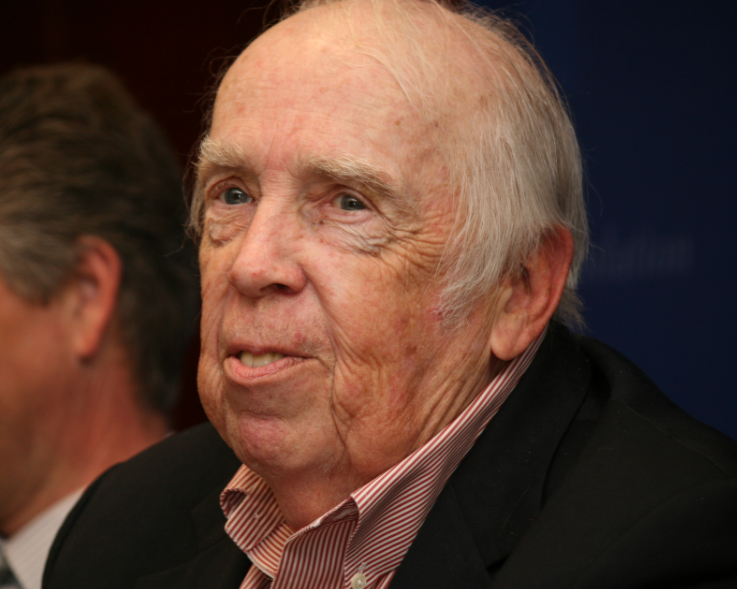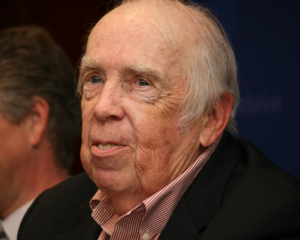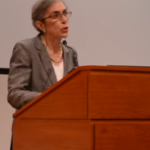The Serious Side of Funny Man Stan Evans

Stanton Evans joked about his “Law of Inadequate Paranoia” at the Thirty Fifth Annual The Pumpkin Papers Irregulars dinner on October 31, 2012. He said, “No matter how bad you think something is, when you look into it, it is always worse.”
The comment was a humorous look at America’s internal security problems. People laughed, but it was nervous laughter. The audience knew that Stan was talking about a real problem that he had dedicated his life to exposing.
At the same event, named after the documents hidden by Whittaker Chambers that confirmed the role of State Department official Alger Hiss as a Soviet spy, Stan said he was optimistic that things would turn around. “I see in the country a rising tide of traditional values, a belief in personal liberty, limited government, strong national defense,” he said. “In other words, an atmosphere of hate.”
Stan made jokes exposing the insidious liberal mentality and its domination of government and what passes for public debate in the media. I recorded and posted a video of the Pumpkin Papers event from a table a few rows back, but you can still get a sense of how great a speaker and how funny he was.
But Stan also wrote important books on conservative philosophy, such as The Theme is Freedom, and ran the National Journalism Center in order to correct liberal bias in the media by training young conservative journalists dedicated to objective reporting and accuracy. Hundreds went through the training process.
I came to the National Journalism Center program as I was graduating from college in journalism in 1978. My work in Stan’s program included an outside internship at Accuracy in Media, and I was then hired by AIM’s Reed Irvine. It was my first job out of college. I later went to work for Allan Ryskind at Human Events.
In short, my career has been blessed by associations with some of the great minds in journalism and the conservative movement. All were Reagan conservatives who believed in the three-legged stool of conservative philosophy—moral values, a strong national defense and economic freedom.
I had an inkling of what journalism was all about after using Curtis MacDougall’s classic textbook, Interpretative Reporting, in college. It helped me to understand that a massive shift had taken place from objective news reporting to advocacy journalism. That’s a major reason why I became a media critic as well as a journalist.
MacDougall, who taught at Northwestern University, ran for office on the Communist-controlled Progressive Party ticket. I obtained Curtis MacDougall’s 319-page FBI file, showing he was on the “security index” of the FBI and under surveillance because of his affiliation with many communist fronts.
As I have previously reported, his Interpretative Reporting textbook criticized the media for being too soft on the late Senator Joe McCarthy (R-WI). It was the perfect primer for a generation of liberal journalists taught to think that anyone opposed to communism or socialism was an extremist. MacDougall advertised himself as an “expert on McCarthyism,” and praised Fidel Castro as a “world statesman” and an anti-imperialist with a “record of achievement.”
It is not surprising, therefore, that in its obituary, the liberal Washington Post took a shot at Stan for trying to “rehabilitate the reputation of Sen. Joseph R. McCarthy with a sympathetic biography.”
In attacking Stan over his McCarthy book, Blacklisted by History: The Untold Story of Senator Joe McCarthy and His Fight Against America’s Enemies, Post reporter Matt Schudel insisted that McCarthy “ruined many careers with his accusations.” Of course, he failed to name anyone whose career was ruined by McCarthy.
Accuracy in Media gave Stan the Reed Irvine Accuracy in Media Award in 2009 for his McCarthy book.
In looking back at Stan’s career, many have noted his role in writing the 1960 Sharon Statement of Young Americans for Freedom (YAF), a group that got me involved in the conservative movement while still in high school. I attended a YAF conference in Sharon, Connecticut, at the estate of William F. Buckley, Jr., and heard Buckley give a powerful speech on how the desire for human freedom will never die.
I was drawn to YAF for its support of what became critical to Ronald Reagan’s conservative coalition—a belief in economic freedom, a strong national defense and traditional moral values.
While Stan had a tremendous impact on the growth and direction of the conservative movement, it’s also the case that we have seen a libertarian tendency assume prominence in recent years. Stan was always a libertarian in the limited government sense, and welcomed libertarians into the conservative movement. But what we are now seeing under the guise of “libertarianism” is something quite different.
Consider the fact that the Charles Koch Institute and the National Review Institute are co-sponsoring an event to promote the book, The Conservatarian Manifesto: Libertarians, Conservatives, and the Fight for the Right’s Future, with the author Charles C.W. Cooke. It is described as a call to arms for the growing movement of members of the right “who are fiscally conservative but socially liberal.” The book strikes me as an attempt to fundamentally transform the conservative movement into an ally of the “progressives” on such matters as gay rights, abortion rights, and drug legalization.
This is not what drove Stan Evans and the candidate he promoted for the presidency, Ronald Reagan.
There is also a foreign policy dimension to this unfolding debacle. Young Americans for Freedom itself seems to have been eclipsed by Students for Liberty and Young Americans for Liberty, libertarian groups which have declared NSA defector Edward Snowden a hero, and sponsor speeches by such left-wing figures as filmmaker Oliver Stone and Snowden mouthpiece Glenn Greenwald.
Based on these curious connections, as well as the adoption of a libertarian foreign policy that quite clearly would permit the Iranians to develop nuclear weapons, I get the definite sense that a traditional conservative belief in a strong national defense is in peril if these libertarians take control of the movement.
One cannot read the Sharon Statement without concluding that Stan Evans and the founders of YAF and the conservative movement were devoted to the national security of the United States. The Sharon Statement referred to the importance of national sovereignty and called for victory over the forces of international communism.
The Sharon Statement is still relevant today.
As we witness a former KGB spy preside over Russia’s re-emergence, in alliance with Communist China, as well as Marxism taking control of country after country in Latin America, we can now understand that declarations of victory over communism were premature. But the goal of the Sharon Statement then and now is still legitimate.
In this context, Stan’s book on Stalin’s Secret Agents, co-authored with Herbert Romerstein in 2012, is required reading. The book demonstrates that we are still coming to grips with the full story of how enemy agents operated on American soil in the highest levels of government. Trevor Loudon’s book, The Enemies Within: Communists, Socialists, and Progressives in the U.S. Congress, brings this terrible story up to date.
Stan Evans showed that we can laugh at the ridiculousness of the liberals while taking seriously the threat they pose to the American way of life.
But with progressives taking aim at, and even infiltrating the conservative movement, we should only laugh long enough to catch our breath and take action to preserve the legacy Stan and so many others left behind for us. Stan’s “Law of Inadequate Paranoia” may not be so funny after all.
Cliff Kincaid is the Director of the AIM Center for Investigative Journalism, and can be contacted at cliff.kincaid@aim.org





